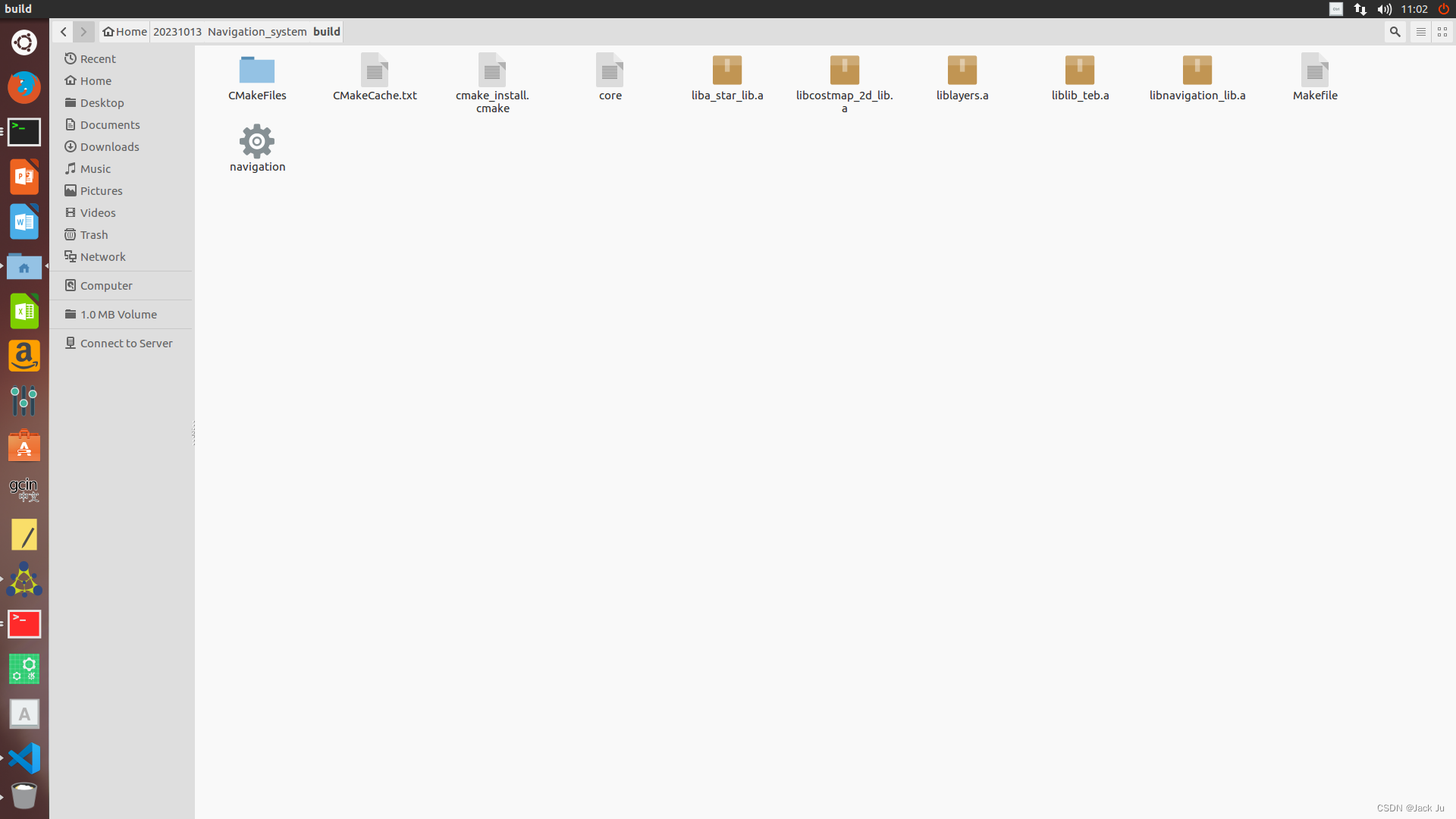C++ boost planner_cond_.wait(lock) 报错1225
1.如下程序段 boost unique_lock doesn’t own the mutex: Operation not permitted
问题:
其中makePlan是一个线程。这里的unlock导致错误这个报错 boost unique_lock doesn’t own the mutex: Operation not permitted
bool navigation::makePlan(){
//cv::namedWindow("Dynamic Image", cv::WINDOW_AUTOSIZE); // 创建一个窗口
global_cost_map_ = planner_costmap_ros_->getCostmap();
costs_ = global_cost_map_->getCharMap();
unsigned int cx = global_cost_map_->getSizeInCellsX(), cy = global_cost_map_->getSizeInCellsY();//xwidth y height
//int x[9] = {748,1332,713,539,535,1424,1577,712,1007}; // x width cx
//int y[9] = {cy-343,cy-312,cy-333,cy - 288,cy - 287,cy - 61,cy - 282,cy - 266,cy - 771};//y height cy
int x[2] = {363,424};
int y[2] = {cy - 694,cy - 1061};
//int k =8;// 6;
int k = 0;
boost::unique_lock<boost::recursive_mutex> lock(planner_mutex_);
while(1)
{
// while(!runner_){
//std::cout << "plan thread enter waiting status!" << std::endl;
planner_cond_.wait(lock);
lock.unlock();
// runner_ = true;
// }
//std::cout << "starting planning..." << std::endl;
if(state_ == PLANNING)
{
global_cost_map_ = planner_costmap_ros_->getCostmap();
costs_ = global_cost_map_->getCharMap();
unsigned int cx = global_cost_map_->getSizeInCellsX(), cy = global_cost_map_->getSizeInCellsY();
convert_offset_ = 0.5;
//lock.unlock();
bool gotPlan = false;//navigation::makePlanner(start,goal,plan_result_cell_);
//std::cout << "Planning Complete!" << std::endl;
}
}
}
分析:
```cpp
boost::unique_lock<boost::recursive_mutex> lock(planner_mutex_);
while (1) {
planner_cond_.wait(lock); // 等待条件变量的通知并解锁互斥量
// 在条件变量的通知下被唤醒后,获取到互斥量的所有权
bool gotPlan = false;
// 执行计划的操作
// ...
// 设置gotPlan为true或false表示是否成功获得计划
lock.unlock(); // 在计划完成后解锁互斥量
lock.lock(); // 重新上锁互斥量
}
在这个例子中,在while循环开始之前,我们创建了一个boost::unique_lock对象并传入互斥量。然后,我们在循环体内调用planner_cond_.wait(lock)等待条件变量的通知,并在等待之前释放锁。当收到条件变量的通知时,unique_lock对象会自动重新获取互斥量的所有权,然后我们继续执行计划的操作。
在计划完成后,我们首先调用unlock()解锁互斥量,然后重新使用lock()重新上锁互斥量,以便在下一次循环开始时可以正确地等待新的条件变量通知。
通过这种方式,我们保证了唤醒的线程可以获得互斥量的所有权,并避免在没有所有权的情况下解锁互斥量导致的错误。
```cpp
bool navigation::makePlan(){
//cv::namedWindow("Dynamic Image", cv::WINDOW_AUTOSIZE); // 创建一个窗口
global_cost_map_ = planner_costmap_ros_->getCostmap();
costs_ = global_cost_map_->getCharMap();
unsigned int cx = global_cost_map_->getSizeInCellsX(), cy = global_cost_map_->getSizeInCellsY();//xwidth y height
//int x[9] = {748,1332,713,539,535,1424,1577,712,1007}; // x width cx
//int y[9] = {cy-343,cy-312,cy-333,cy - 288,cy - 287,cy - 61,cy - 282,cy - 266,cy - 771};//y height cy
int x[2] = {363,424};
int y[2] = {cy - 694,cy - 1061};
//int k =8;// 6;
int k = 0;
boost::unique_lock<boost::recursive_mutex> lock(planner_mutex_);
while(1)
{
// while(!runner_){
//std::cout << "plan thread enter waiting status!" << std::endl;
planner_cond_.wait(lock);
lock.unlock();
// runner_ = true;
// }
//std::cout << "starting planning..." << std::endl;
if(state_ == PLANNING)
{
global_cost_map_ = planner_costmap_ros_->getCostmap();
costs_ = global_cost_map_->getCharMap();
unsigned int cx = global_cost_map_->getSizeInCellsX(), cy = global_cost_map_->getSizeInCellsY();
convert_offset_ = 0.5;
//lock.unlock();
bool gotPlan = false;//navigation::makePlanner(start,goal,plan_result_cell_);
//std::cout << "Planning Complete!" << std::endl;
}
lock.lock();//循环结束要上锁
}
}
2. 上述线程占用CPU资源较大,如何处理?
可能是因为程序中的循环没有适当的等待时间,导致CPU不断地执行循环代码。为了降低CPU占用率,您可以在循环中添加适当的等待时间。
具体在循环添加如下等待时间:
std::this_thread::sleep_for(std::chrono::milliseconds(100));
3. C++ 报错 coredown如何解决?
Aborted (core dumped)
首先设置“
ulimit -c unlimited //将coredown文件设置不限制存储空间
重新执行问题程序,camke 编译后在build文件下

发生core dump之后,使用gdb查看core文件的内容, 以定位文件中引发core dump的行,在在Linux下,查看core文件中的出错堆栈信息有二种方式,使用:gdb -c core.pid program_name或gdb [program_name] [core.pid]可以进入gdb模式:
在进入gdb后输入where并回车,就可以指出是在哪一行被Down掉,在哪个函数内,由谁调用等等。
在进入gdb后输入 bt,用bt命令查看backtrace以检查发生程序运行到哪里,来定位core dump的文件->行。
那我们的文件下运行
gdb -c core navigation
然后再输入
where
Reference
本文来自互联网用户投稿,该文观点仅代表作者本人,不代表本站立场。本站仅提供信息存储空间服务,不拥有所有权,不承担相关法律责任。 如若内容造成侵权/违法违规/事实不符,请联系我的编程经验分享网邮箱:chenni525@qq.com进行投诉反馈,一经查实,立即删除!
- Python教程
- 深入理解 MySQL 中的 HAVING 关键字和聚合函数
- Qt之QChar编码(1)
- MyBatis入门基础篇
- 用Python脚本实现FFmpeg批量转换
- TensorFlow是什么
- 万物简单AIoT物联网平台快速开始
- Python 中如何编写类型提示
- Blender——将模型及其所有纹理与材质材质导入unity
- 基于SSM的流浪动物救助网站的设计与实现-计算机毕业设计82131
- 【Spring Cloud】关于Nacos配置管理的详解介绍
- 钡铼 楼宇暖通网关之 BACnet网关在空气源热泵智能控制系统中的应用介绍
- uniapp中按钮点击跳转页面失效,纠正错误(亲测可用)
- 【Git】在 IDEA 中合并多个 commit 为一个
- 尼科彻斯定理----C语言